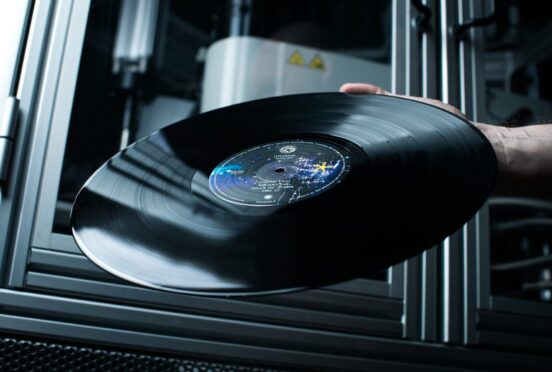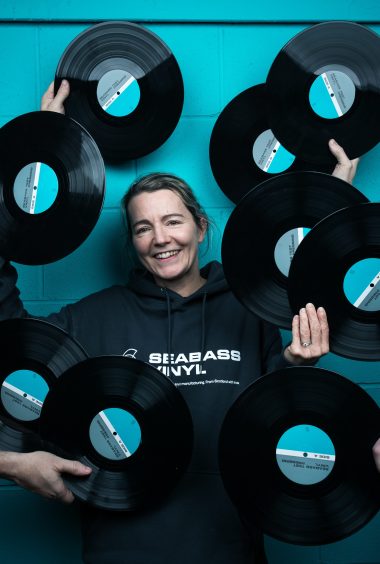
Since becoming popular in the 1950s, to its seeming demise in the ‘90s, to the more recent resurgence as the format of choice for music connoisseurs, vinyl records have been made with the same substance.
But musicians are increasingly turning to an alternative form of PVC, used to make the shiny black discs, created from an unlikely source: recycled cooking oil.
Scottish start-up company Seabass Vinyl is pressing records using the new type of eco-friendly plastic, with cult punk artist Vic Godard its first customer.
The PVC is created by using cooking oil and other industrial byproducts to create a bio-vinyl indistinguishable from traditional plastics.
“The most important thing is that it is the right quality, and there is no difference from an acoustic perspective versus standard PVC – listeners won’t lose any sound quality,” said David Harvey, who opened Seabass Vinyl, the country’s only vinyl pressing plant, late last year along with his wife Dominique.
“It’s the same product, just made from used cooking oil.”
Bio Vinyl
The Bio Vinyl is created by Dutch company Plastchem from waste oil, and reduces the carbon footprint of PVC by 90%.
“We expect to press this stuff the same way as we do with normal PVC, although there’s a chance it’ll require different heat,” said Dave.
“Sustainability is important to us but it’s important to the artists. We have people coming to us specifically because of the low carbon footprint of the plant, and the approach that we’ve taken to sustainability.”
Although the new type of vinyl doesn’t rely on fossil fuels, it is at the moment slightly more expensive than traditionally produced PVC.
“The cost of using the biodegradable vinyl is an extra 55p per unit,” added Dave. “Although Seabass Vinyl doesn’t put a mark-up on that, because we’d like more people to use it.”
Dave hopes the cost will come down as the processes become more streamlined. “There are labels in Europe who are starting to announce that all of their releases will be only using this type of material,” he said.
“The problem is at the moment it’s expensive, up to 75% more expensive – but that cost should come down, and it’s not like oil, which PVC is made from, is getting cheaper.
“We think demand for bio-vinyl, and other low-carbon vinyl products, will only grow and grow.”
Cult singer-songwriter Vic Godard’s new album, Everybody’s Scared Now, which was recorded on Islay, will be made by Seabass Vinyl using bio-vinyl, which has a 90% smaller carbon footprint than regular LPs. Godard formed the punk band Subway Sect in the 1970s and now regularly releases recordings through his label Gnu Inc. He had been told about Seabass by a music-industry contact in Edinburgh.
“I’d never heard of bio-vinyl before, so I read up on it and it sounds good,” he said. “I didn’t like the impact of regular vinyl, given that it comes from the oil industry.”
New releases
Stephen Bass owns the label PRAH Recordings, which releases music by electronic and classical artists across the UK. He intends to use bio-vinyl on releases coming out this summer.
“I’ve been so impressed with Seabass Records. Their test pressings sound incredible,” he said. “Record shops are still a vibrant and important way of finding music. However, vinyl technology is ancient. No one has bothered to improve it until now, and I’m sure people will want bio-vinyl.
“Anything you can do to help people pause for a moment, to take time to listen, is a positive thing.”
Scottish company Seabass get back in the groove with vinyl revival
Seabass Vinyl aims to reduce the environmental impact of everything it does, from sourcing their cardboard in Scotland to recycling unused records to be pressed again. The company opened its plant in the East Lothian town of Tranent in November and has since pressed records for artists like Godard, Fish and is in negotiation with an unnamed Scottish band to press its record using bio-vinyl.
“It’s word of mouth – getting the message out there so more and more artists become aware of it,” said Dave. “The key thing, for me, with Seabass is, so far, every artist who has made an order with us has made a second order. That has to be a good sign!”
London-based Godard was also keen to work with Seabass because it was closer to home. Previously, like many artists, he had records made using larger plants in the Czech Republic.
“It’s great to have this technology on home turf,” he said. “There were a lot of miles involved before.”
The Deep Fried Top 10…
- Fry Me To The Moon – Frank Sinatra
- Greasy Lover – Philip Bailey & Phil Collins
- Didn’t We Almost Haddock All – Whitney Houston
- It Must Have Been Olive – Roxette
- Oil Be There For You – The Rembrandts
- You Batter You Bet – The Who
- Chip To Be Square – Huey Lewis & The News
- Fritter Happier – Radiohead
- Things Canola Get Better – D:Ream
- Sweet Disposition – Tempura Trap

Enjoy the convenience of having The Sunday Post delivered as a digital ePaper straight to your smartphone, tablet or computer.
Subscribe for only £5.49 a month and enjoy all the benefits of the printed paper as a digital replica.
Subscribe © Andrew Cawley
© Andrew Cawley